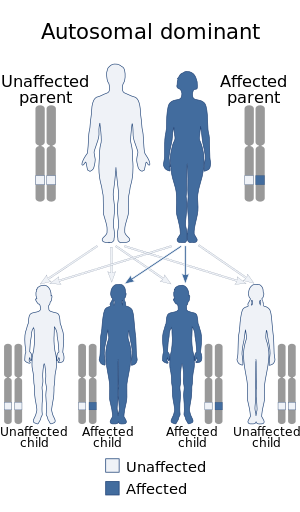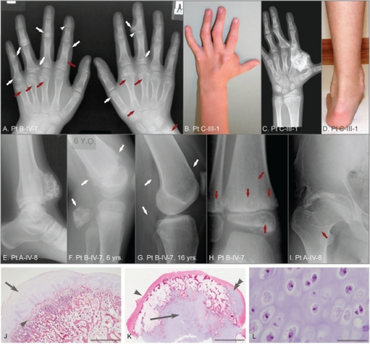Metachondromatosis
| Metachondromatosis | |
|---|---|
| Other names: METCDS[1] | |
 | |
| Metachondromatosis has an autosomal dominant pattern of inheritance. | |
Metachondromatosis is an autosomal dominant, [2] incompletely penetrant[3] skeletal disorder affecting the growth of bones, leading to multiple enchondromas and osteochondromas.[3] This tumor syndrome affects mainly tubular bones, though it can also involve the vertebrae, small joints, and flat bones.[4]
Signs and symptoms

The clinical presentation of Metachondromatosis is the following:[1]
- Abnormality of metaphysis
- Avascular necrosis
- Bone pain
- Cranial nerve paralysis
Genetics
Metachondromatosis is inherited in an autosomal dominant manner.[3] This means that the defective gene responsible for a disorder is located on an autosome, and only one copy of the gene is sufficient to cause the disorder, when inherited from a parent who has the disorder.[citation needed]
It has been associated with PTPN11.[3]
Diagnosis
The diagnosis of this condition is based on the following:[5]
- Clinical signs
- Radiographic findings
- Familial history
Differential diagnosis
The DDx for this condition is consistent with the following:[5]
- Hereditary multiple osteochondromas
- Ollier disease
- Maffucci syndrome
- Dysplasia epiphysealis hemimelica
Treatment
In terms of the management of this condition, severe malalignment can be dealt with via surgery[5]
References
- ↑ 1.0 1.1 "Metachondromatosis | Genetic and Rare Diseases Information Center (GARD) – an NCATS Program". rarediseases.info.nih.gov. Archived from the original on 20 April 2021. Retrieved 23 December 2021.
- ↑ Kennedy LA (1983). "metachondromatosis". Radiology. 148 (1): 117–8. doi:10.1148/radiology.148.1.6602353. PMID 6602353.
- ↑ 3.0 3.1 3.2 3.3 Sobreira NL, Cirulli ET, Avramopoulos D, et al. (2010). "Whole-genome sequencing of a single proband together with linkage analysis identifies a Mendelian disease gene". PLOS Genet. 6 (6): e1000991. doi:10.1371/journal.pgen.1000991. PMC 2887469. PMID 20577567.
- ↑ Hunter AG, Kozlowski K, Hochberger O (1995). "Metachondromatosis". Can Assoc Radiol J. 46 (3): 202–8. PMID 7538882.
- ↑ 5.0 5.1 5.2 RESERVED, INSERM US14-- ALL RIGHTS. "Orphanet: Metachondromatosis". www.orpha.net. Archived from the original on 27 June 2019. Retrieved 23 December 2021.
External links
| Classification | |
|---|---|
| External resources |